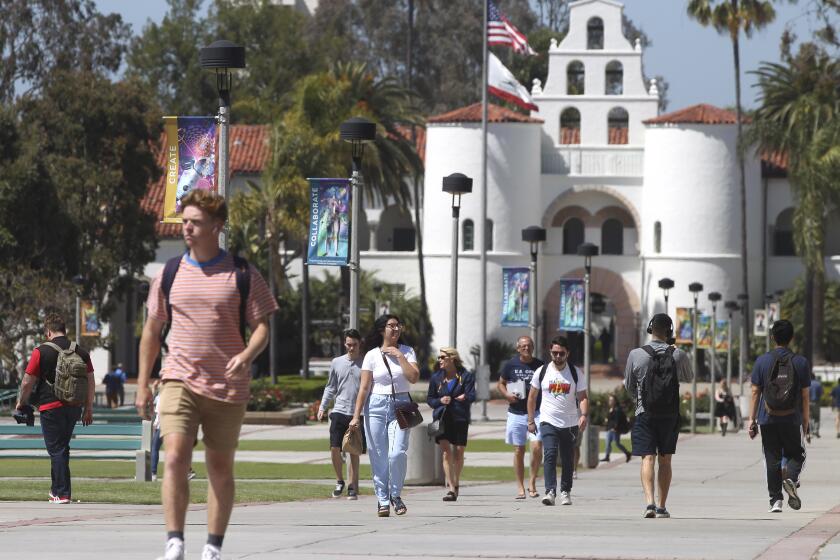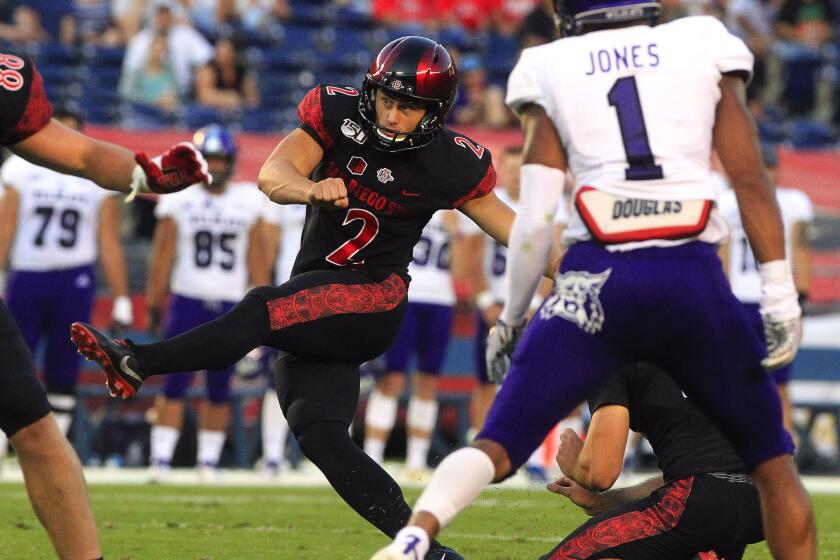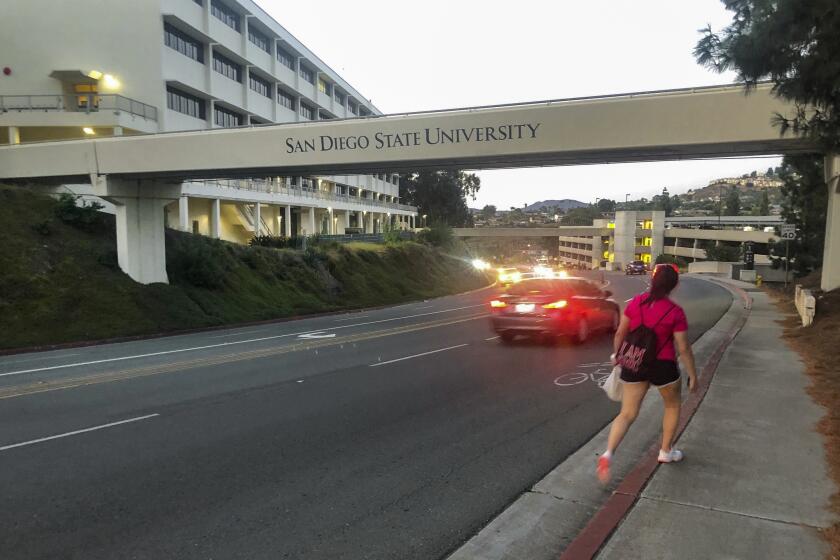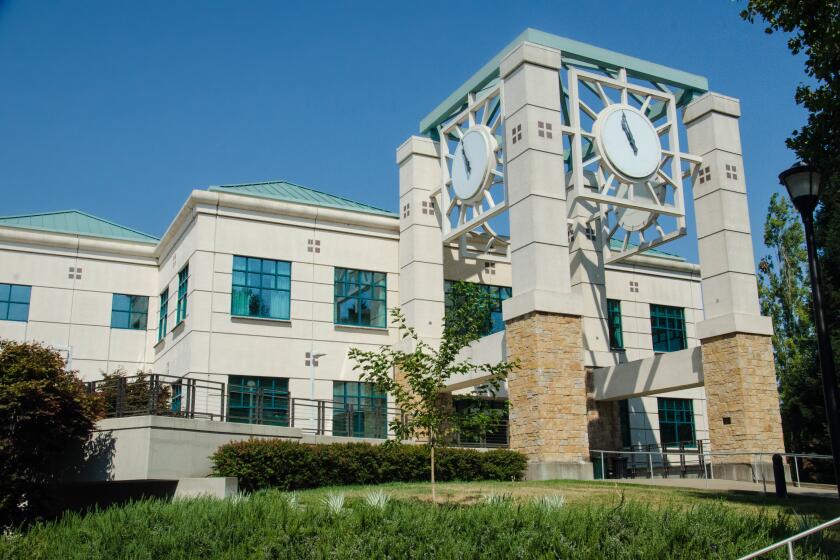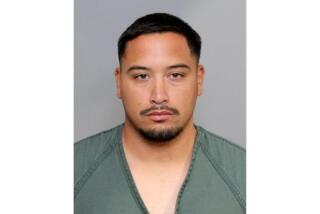No charges filed in San Diego State gang rape case, district attorney’s office says
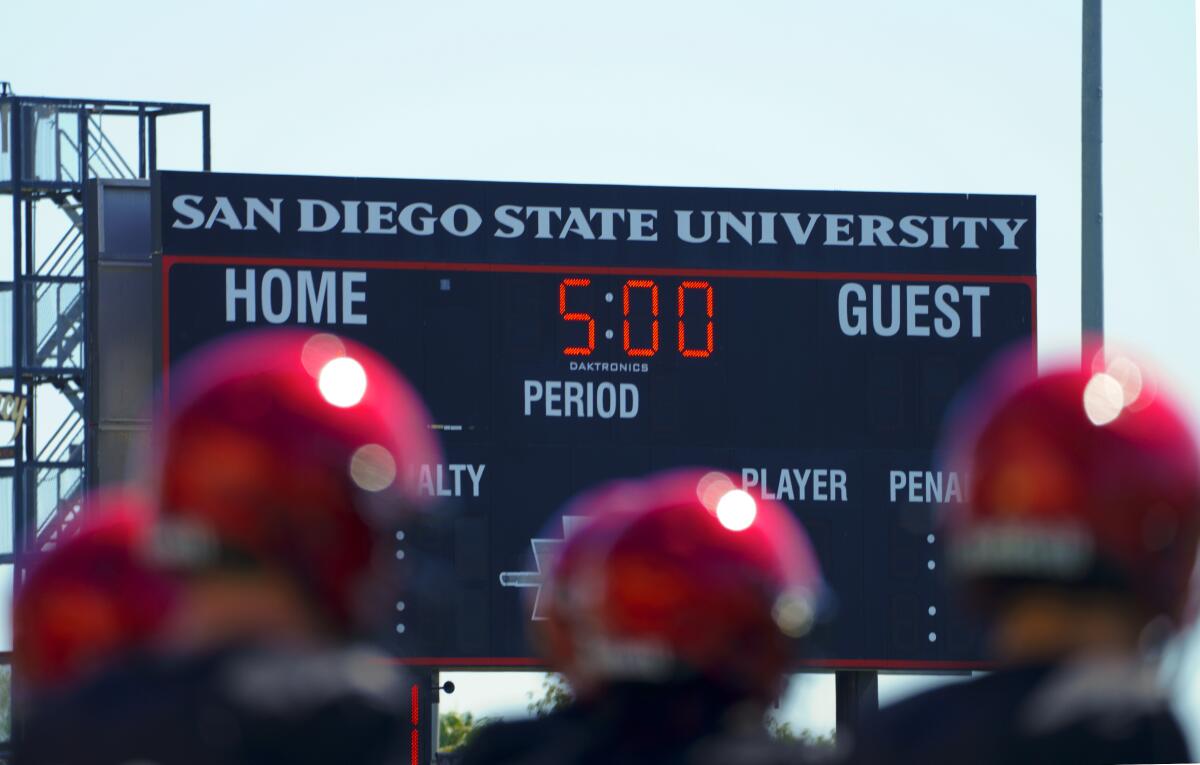
- Share via
SAN DIEGO — Former Buffalo Bills and San Diego State punter Matt Araiza will not be charged in connection with the reported gang rape of a 17-year-old girl at an off-campus party last year, officials announced Wednesday.
The San Diego County district attorney’s office said two of Araiza’s former Aztec teammates will not be charged either in a case that rocked the university over the summer.
The decision not to file charges, more than a year in the making, marks a pivotal moment in one of the most-watched criminal cases in the county.
After reviewing evidence that included video footage “of the incident itself,” prosecutors determined “there is no path to a potential criminal conviction,” Dist. Atty. Summer Stephan’s office said in a statement.
“Prosecutors can only file charges when they ethically believe they can be proven beyond a reasonable doubt,” the statement read.
Attorney Dan Gilleon, who represents the young woman, said he is “never surprised when a prosecutor does not file sexual assault charges when the victim was intoxicated.”
“It’s a very rare case where the criminal justice system achieves anything satisfactory for the victim in a sexual assault,” Gilleon said in a text message.
He said the civil suit his client filed in August against three young men she accused will move forward.
Students, faculty and experts say the university’s statements on the allegations have undermined public confidence in the school.
“In the criminal system, the victim is just another witness,” Gilleon said. “She is not represented by anyone…. The lawsuit we filed is not in the criminal justice system. It’s a different ballgame here. The victim is represented, and the focus is on the harm defendants caused her.”
Araiza’s criminal defense attorney applauded the decision not to file charges.
“I never felt, not even for a second, that [Araiza] was lying to me about what happened that night,” Kerry Armstrong said. “I felt confident, based on what I knew, that they would reject the case.”
The attorneys representing two of the now-former players whose names surfaced in public allegations echoed those sentiments Wednesday.
“Clearly, I agree with the findings of the district attorney,” said Marc Carlos, who represents Nowlin “Pa’a” Ewaliko, a redshirt freshman at the time of the incident.
Carlos said the prosecution did “due diligence in this matter in deciding that there was insufficient evidence to get a conviction at trial.”
A lawyer for the woman who alleges she was raped by Araiza and two San Diego State football players publicly released excerpts of her diary.
Attorney Jamahl Kersey, who represents Zavier Leonard — also a redshirt freshman in fall 2021 — said he believes the district attorney’s office made “the correct decision” not to move forward with criminal charges.
Police and prosecutors have said little about the facts of the case. Details of the allegations were revealed first in a Los Angeles Times story and then in a civil lawsuit the athletes’ accuser filed in August naming Araiza and his former SDSU teammates Ewaliko and Leonard.
Within two days of the filing, the Bills cut Araiza and the Aztecs cut Leonard. Ewaliko had left the team a few weeks earlier.
In his senior season, Araiza set an NCAA record with a 51.19-yard punting average. He earned the 2021 Ray Guy Award as the nation’s top punter. He became known by the nickname “Punt God.”
In April, the Bills used the first pick in the sixth round of the 2022 NFL Draft to select Araiza, a Rancho Bernardo High School graduate. He was the first punter drafted by the team since 1990.
Armstrong said Wednesday that Araiza has been training since he returned from Buffalo and “wants to get back to the NFL.”
According to the lawsuit filed by the now 18-year-old woman, the incident occurred at a College Area home not far from campus early Oct. 17, 2021.
The 18-year-old expressed frustration with the ongoing police inquiry and the lack of action by San Diego State.
The suit alleges that Araiza, then 21, raped the teen in a side yard of the residence before bringing her inside to a bedroom, where a group of men took turns raping her. Leonard and Ewaliko were part of that group, the suit said.
The teen said that she was in and out of consciousness and that her ear, belly and nose piercings were ripped out as men assaulted her for about 90 minutes. She said she stumbled out of the room bloodied and bruised and immediately told her friends she’d been raped.
She reported the assault to San Diego police the following day. Nine months later, shortly after the teen filed her civil suit, San Diego police turned the results of their investigation over to prosecutors for review.
Araiza’s attorneys in the civil case issued a lengthy statement Wednesday saying that the “allegations are not facts” and that the evidence shows “Araiza is innocent.”
“We look forward to defending Mr. Araiza in this civil lawsuit filed by the plaintiff and clearing his name as it relates to these allegations against him — once and for all,” attorneys Dick Semerdjian and Kristen Bush said in the statement.
They also accused Gilleon of making false claims “through his extensive media campaign.”
In the criminal investigation, the district attorney’s office said Wednesday that it evaluated several potential charges including statutory rape, forcible rape, forcible oral copulation and rape by intoxication. The office also said that the San Diego Police Department did not recommend charges be filed when the case was submitted.
During their review, prosecutors and investigators analyzed evidence that included more than 35 taped witness interviews, the results of a Sexual Assault Response Team exam, DNA results, and evidence from 10 search warrants, which included video evidence of the incident itself, officials said.
San Diego State University held off investigating at the request of police, who say their inquiry into the alleged October incident involving a minor is ongoing.
The office said it met two times with the young woman who reported the rape and offered support from the victim services department.
Gilleon said his client met with prosecutors once a few weeks ago during the investigation. He said she was shown “graphic” videos taken during the sexual encounter — images that Gilleon said supported the allegations in her civil suit. The second meeting, he said, was Wednesday morning when prosecutors told her they were not filing charges.
Asked about his client’s reaction to the news that there would not be a criminal case, Gilleon said she was “upset, obviously.”
According to figures released by the district attorney’s office, just over a quarter of cases involving rape and related sex crimes resulted in charges being issued from 2017 through 2021.
Aside from the criminal case, critics have condemned the university for failing to launch an administrative inquiry into the allegations of misconduct by student athletes on a winning team. San Diego State said it had deferred investigating at the request of police for fear it would harm the criminal investigation.
Recent revelations about how California State University handled sexual harassment and workplace retaliation complaints have rocked the nation’s largest four-year public university system.
University President Adela de la Torre issued a statement Wednesday afternoon saying that the school’s inquiry is still under way. She said that since police gave San Diego State the go-ahead in July to start its inquiry, the school has “interviewed individuals from across our community and reviewed a range of evidence.”
She did not disclose details of what they have found, saying “certain information will not be shared due to privacy laws that restrict what information a university can legally share.”
Grand juries are sometimes used in high-profile cases to determine whether there’s enough evidence to file criminal charges. Like trial juries, grand jury participants are made up of community members and differ from the county grand jury that investigates government programs and operations.
The district attorney’s office said Wednesday that a grand jury was not convened in connection with the case.
More to Read
Sign up for Essential California
The most important California stories and recommendations in your inbox every morning.
You may occasionally receive promotional content from the Los Angeles Times.
